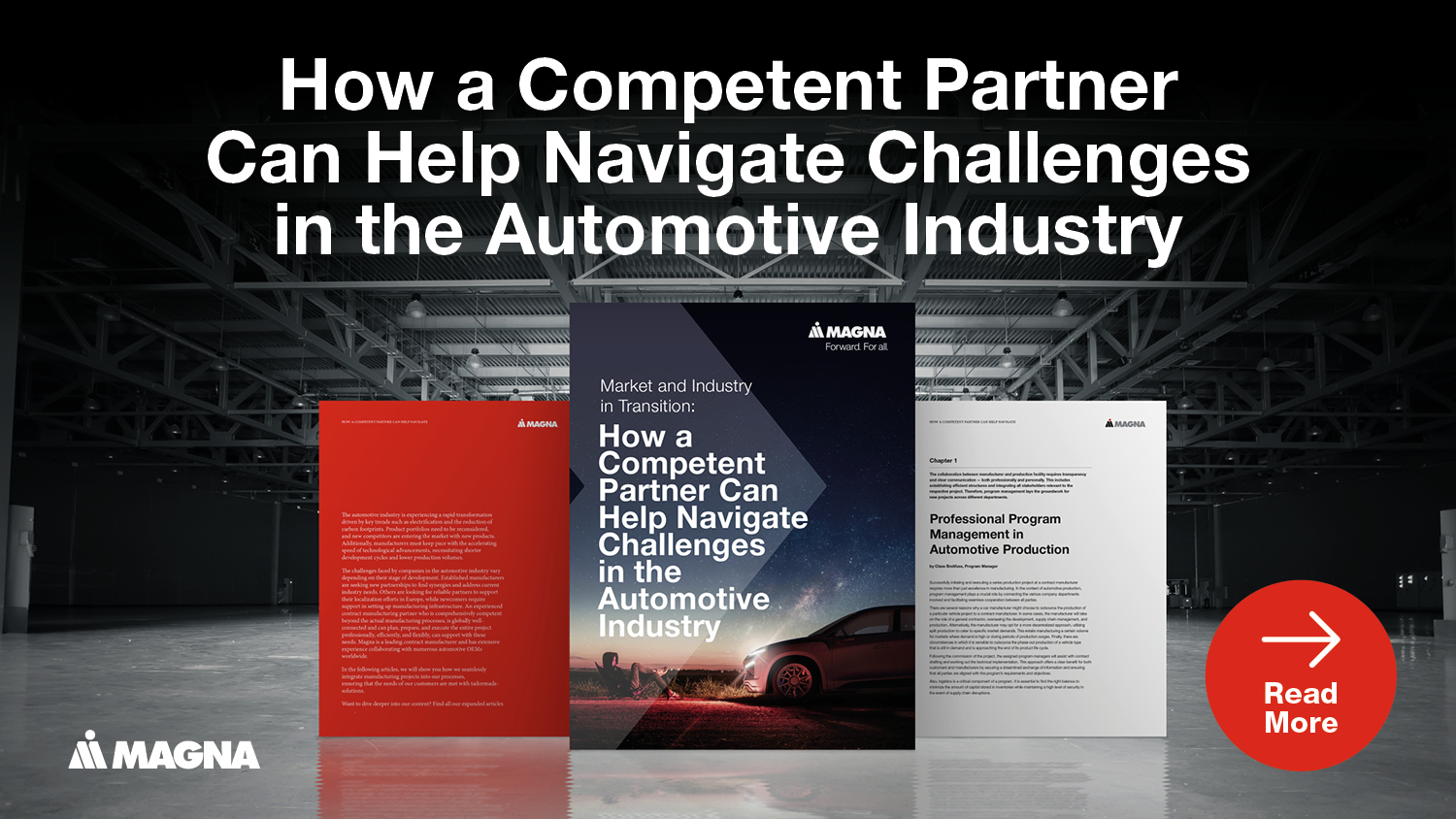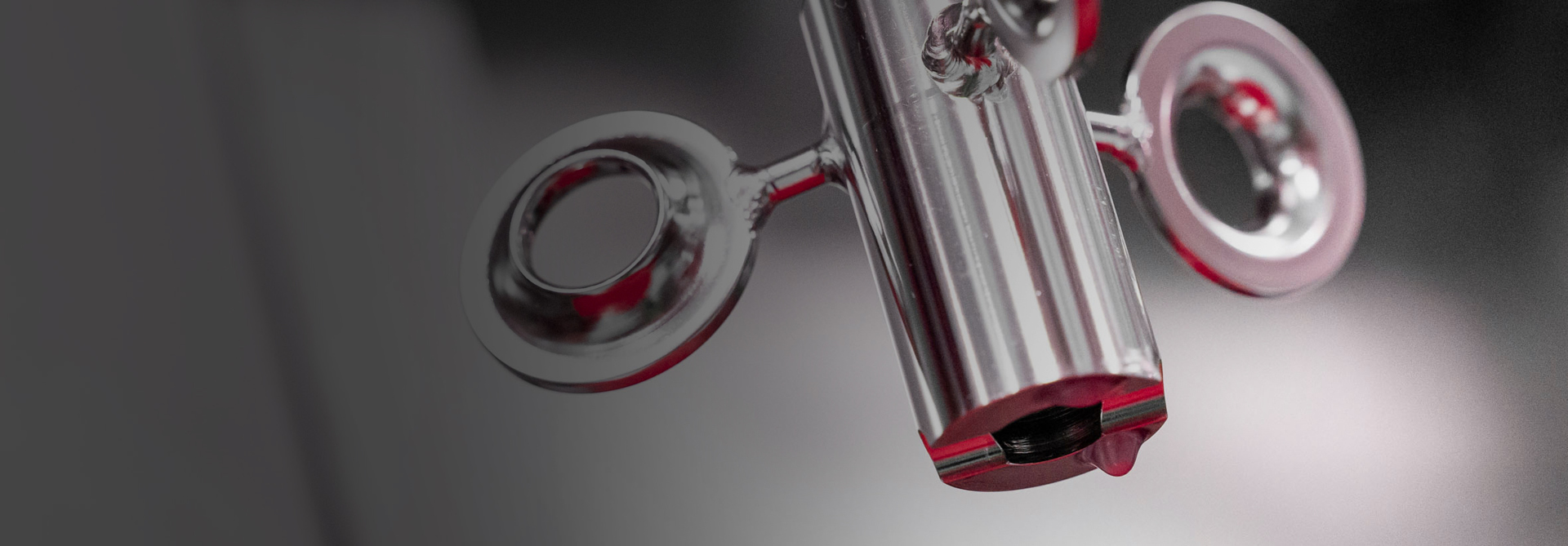
COMPREHENSIVE SQA INSTEAD OF INCOMING GOODS INSPECTION
The importance of zero-defect delivery is crucial in modern automotive production. The days of incoming goods inspections are now a thing of the past. Today, components are ideally delivered directly to the production line, in the exact order in which they are required for the respective vehicle variant. After all, defects in the supplied parts may render them unable to install. In the worst case, production may even have to be stopped if no immediate countermeasures can be taken.
To avoid such incidents from the outset, supplier quality assurance (SQA) is involved in the early stages of project preparation during sourcing, i.e. the selection of suppliers. Depending on the project, the manufacturer placing the order may choose their suppliers. Or the supplier selection is carried out by the contract manufacturer itself, naturally in consultation with the customer, who must approve the decision or at least have a right of veto. The selection of the supplier is decided based on the supplier rating. This rating is based on experience and evaluation of previous projects, and is basically divided into three levels: green, yellow and red. It is self-explanatory that suppliers rated “red” are only worked with if, for example, the customer insists on it.
SOURCING IN COOPERATION BETWEEN PURCHASING AND SQA
Purchasing is tasked with finding the best and most cost-effective supplier, considering the total costs, including logistics and other additional costs in both monetary and environmental terms. SQA is responsible for determining whether the supplier who submits a quotation for a particular component can manufacture and deliver it reliably in the required quantity and in the defined quality.
To this end, a source evaluation is carried out on the supplier at the very beginning of the project. This assesses whether the supplier in question is suitable from a quality perspective – based on previous experience, for example. It is not enough to be satisfied with the fact that the supplier is IATF 16949-certified. This only proves that the supplier has the necessary basic tools for comprehensive quality management. Instead, the source evaluation assesses how the supplier uses these tools to measure and monitor its own quality performance.
It is vital for the source evaluation to carefully inspect the company. Where does the supplier plan to manufacture? What equipment is used for production? How is work carried out there? An assessment based purely on documents, as offered by some service providers without a direct on-site inspection, cannot do this reliably.
CLOSE AND TRUSTING COOPERATION WITH SUPPLIERS FROM THE VERY BEGINNING
As soon as the supplier has been nominated, the contract manufacturer works closely with the supplier to work out the details. The supplier's processes are closely examined as part of supplier quality assurance. In individual cases, this can also mean that for critical parts, individual aspects of the design of the part or tool are changed. This ensures process reliability, for example if the radius of a body-in-white part is increased to reduce thinning or avoid split. However, this can only be implemented in conjunction with the development department. This is why SQA is an essential member of the development team right from the start.
The aim is that by the SOP (Start of Production), meaning the start of series production, the supplier is at a stage where they can manufacture the required quantities, and the quality of the parts meets all expectations. To this purpose, the development phase is used to repeatedly check whether, for example, the relevant systems have already been set up and are being operated and whether toolmaking is progressing according to the agreed upon schedule. Or, for example, whether the employees have already been appropriately trained. As a rule, this allows a reliable forecast to be made as to whether the supplier is as ready for the SOP as the schedule requires.
RELATIONSHIP BUILDING - COOPERATION INSTEAD OF OPPOSITION
However, there are always cases where additional obstacles get in the way. Like for example, if life cycle tests have shown that technical changes to components are still required. This means that the tools must be changed again. In such situations, an experienced contract manufacturer who has already carried out several successful automotive production projects with the supplier in question has a clear advantage over a less experienced quality or SQA service provider. The experienced contract manufacturer strives for close, long-term cooperation with the supplier instead of simply increasing the pressure.
If the selected supplier or one of its subcontractors is faced with challenges, a solution is sought together through on-site support. Open cooperation is essential, especially in difficult situations. The contract manufacturer contributes its many years of experience, patience and perseverance. As cooperation with suppliers is usually long-term, it is very important that both parties can emerge from such a critical situation with intact relations.
SWITCHING SUPPLIERS AT SHORT NOTICE IS GENERALLY NOT AN OPTION
In the end, there is no alternative to a joint effort to manage the start-up despite potential problems. Changing suppliers at the last minute is extremely difficult, as there are no systems and tools readily available from another partner. In addition, a change of supplier requires a long preparation period, as all tests must be carried out again.
Usually, it is impossible to implement such a change within short term. From a certain point onwards, the manufacturing company and the supplier are locked in a kind of shared responsibility: any problems that arise must be overcome together in order to achieve the common goal.
Top priority is given to the zero-defect delivery of parts, as incoming goods inspections are only carried out if a problem occurs. In such cases, the parts must be checked, sorted or, in the worst case, reworked, which costs time and money. It is therefore essential for a smooth production process to take measures together with the supplier in advance to ensure that defect-free parts are delivered to the production line. At the same time, it is important to make the supplier aware that you not only support them, but also that you will continue to cooperate with them after a successful start of series production. Only those who prove themselves in supplier quality assurance will also be considered for future projects.
CLEAR QUALITY SPECIFICATIONS, PRECISE INSPECTIONS
In addition to the design specifications, which are defined at the start of the project, the delivered parts must above all pass durability tests, from mechanical durability and ease of assembly and disassembly to resistance to climatic influences. As usual, a distinction is made here between zero mileage quality (i.e. the condition of the parts at the time of installation) and field quality (i.e. durability and functional reliability during practical use of the vehicle).
However, one important aspect of zero mileage quality is not defined in detail in the sourcing phase at the start of the project: the required tolerances, i.e. the required manufacturing accuracy. This is only determined during the development process. The supplier must use suitable tests to check whether the quality of the parts meets the requirements. With the positive initial sampling, the supplier confirms that the components meet the requirements. The test areas of the initial sampling are confirmed by the SQA.
In addition, a process acceptance test is carried out at the supplier's premises relatively close to the SOP. The supplier either manufactures a certain number of parts or produces for a certain number of hours in the presence of one or more SQA specialists. The parameters are then measured and tested. This procedure is a practical way of demonstrating whether the staff are adequately trained, whether the equipment is suitable, and whether the inspection and measurement of the parts works smoothly. This ensures that the entire production process runs safely and reliably.
IF SOMETHING HAPPENS ANYWAY: THE PROCEDURE IN THE EVENT OF A DEFECT
During ongoing automotive series production, a check, such as dimensional accuracy, is carried out automatically when the parts are installed on the production line. If the part cannot be installed as usual or if there are visible defects (such as a scratch) the employees report this immediately. An inspection is then carried out to determine whether other parts from the same delivery have similar defects. If this is the case, the entire delivery is sorted. The supplier is informed via claim to investigate the cause of the defects themselves.
As long as the supplier does not report a clean point, i.e. the successful elimination of the problem that has occurred, all deliveries are subjected to a sorting process for which external sorting companies are commissioned. The quite considerable costs for these additional measures are charged to the supplier if the defect in question lies within their area of responsibility. It is therefore in the supplier's own interest to supply defect-free components.
If such cases occur more frequently and even lead to escalation, the Supplier Quality Assurance department conducts an audit at the supplier to verify the improvements and countermeasures. The supplier must not and should not make any changes to the manufacturing process without authorization. Changes can only be made once they have been agreed upon and approved by the SQA of the production plant.
MAGNA SQA EMPLOYEE TRAINING AS BACKGROUND: THE SQA CURRICULUM
Magna SQA Employees also have an important role to
play in ensuring supplier quality process with the goal that all produced parts
meet the requirements. They must have the necessary skills to recognize issues
and immediately initiate appropriate measures. This is why Magna began to
develop and expand these skills at an early stage through suitable education
and training programs. The “SQA Curriculum” is a type of basic training that
all Magna SQA employees undergo and consists of wide range of topics and applicable
content, such as: Automotive Core Tools, Comprehension of automotive Standards
(VDA, AIAG, IATF, etc.), Goals and tasks of SQA, Project milestones and
obligatory documentation, Comprehension of Specifications and Tolerances from
suppliers and customers point of view, Claim process, Comprehension and use of internal
programs and systems.
QPF - THE COMMUNICATION PLATFORM BETWEEN CONTRACT MANUFACTURERS AND SUPPLIERS
Magna also launched its own online communication system in Graz and then implemented it worldwide. Over 20 years ago, Magna created its own quality platform (QPF) for open and transparent communication with suppliers and has continued to develop it ever since. This is an online tool through which all communication takes place. This begins with the order specification at the start of the project and continues with the Milestones, APQP, Tool Tracking module, which relates to critical tools that are to be procured, the progress of which the supplier must report regularly. The entire documentation of the process acceptance also runs on this platform, as does the topic of initial sampling.
The QPF system also records all steps and tasks that the supplier must fulfill during the ongoing project. The suppliers are visited at regular intervals and their project management is examined. Questionnaires are completed together in the QPF system, and the results are recorded by both parties. This then results in a project report which highlights any weak points and is also included in the evaluation for supplier quality assurance.
Any quality claims are also reported via the QPF, including defect descriptions and photos. The entire process flows into the continuous supplier evaluation. In addition, the system determines the total costs incurred as a result of the complaint, which are charged to the supplier or deducted from their invoices.
NEW CHALLENGES IN QPF: SOFTWARE DEVELOPMENT
Software engineering is an increasingly important topic within the supplier quality assurance sector. Especially when it comes to control units, there are already very good specifications and requirements but only a few large suppliers can comply with them. Smaller suppliers are often unwilling to reveal their secrets. It would be possible to penalize them by setting them to the “red” level. However, this could result in very few suppliers being available for cooperation. It is therefore necessary to take alternative measures to achieve the desired goals.
This challenge is not only faced by contract manufacturers in automotive production, but also by the vehicle manufacturers themselves. The number of current recalls due to software errors speaks volumes. In this respect, the topic of software quality assurance still has a lot of potential for the future – in the entire industry.
Stay connected with Inside Automotive!

We want to hear from you
Send us your questions, thoughts and inquiries or engage in the conversation on social media.
Related Stories
Stay connected
You can stay connected with Magna News and Stories through email alerts sent to your inbox in real time.





